Feras Ismail grew up between a busy, middle-class neighborhood in Damascus and a village in Quneitra, a fertile district southwest of the Syrian capital near the border with Israel. During his childhood, he heard elders in his community speak of Abkhazia’s beautiful, snow-capped mountains and dense, evergreen forests. Feras also learned about the war between Georgia and Abkhazia in the early 1990s. He knew that the Abkhaz people longed for their own independent nation and that their country wasn’t really a country—at least, not a recognized nation like Serbia, Egypt, Venezuela, and Romania, places where Feras would travel later in life as a professional soccer player.
Feras had known all of this growing up because he was Circassian, an ethnic minority in the Middle East that also includes some of Abkhaz descent. The Circassians are a northern Caucasian people who rebelled against Tsarist Russia in the mid-1800s and were largely wiped out in the process. In the 1860s, some 500,000 Circassians were deported to what was then the Ottoman Empire. A decade later, several tens of thousands of Abkhaz who had supported the Ottomans in their war against Russia were exiled to the Middle East as well.
But Feras isn’t just Circassian; he is also Syrian. Syria is where he was born, Arabic was his first language, and he is proud to have played soccer for Syria’s national team. In this way, Feras juggles two identities, as anyone does in the United States who feels American but also Irish, Italian, or Pakistani. Feras feels loyal to his Circassian community within Syria. He married an Abkhaz-Syrian woman and remained patriotic toward his homeland—by which he meant Syria.
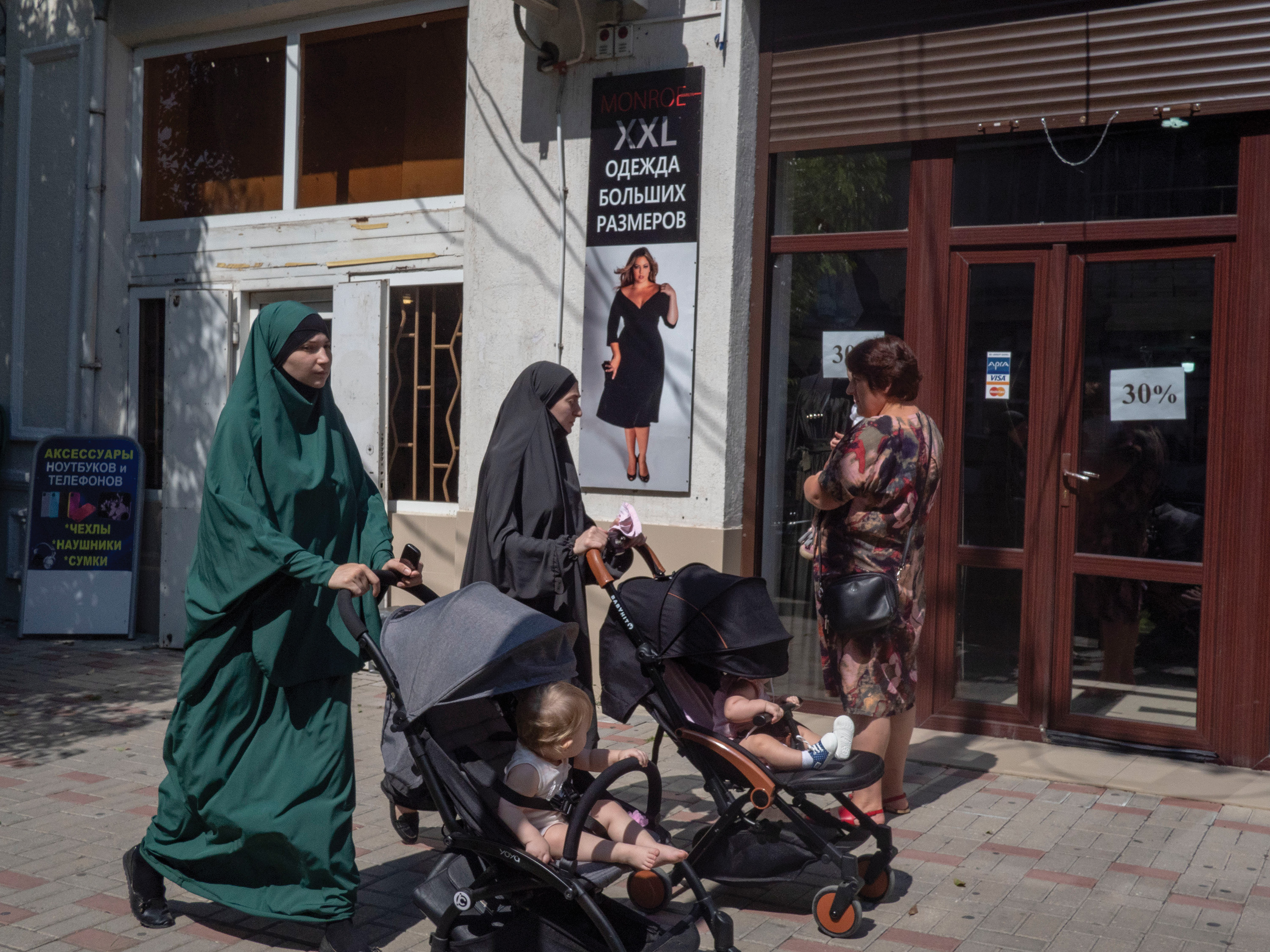
After violence broke out in Syria in 2011, beginning what has spiraled into an immeasurably brutal civil war, Feras looked for ways to leave his country. He was hired to play midfield for a soccer league in Iraqi Kurdistan, and then later in Bahrain, but Bahrain didn’t renew his visa in 2016. “We have difficulties with Syrian passports. Wherever you go, it’s ‘Syrian no, Syrian no,'” Feras explains. There was one exception: a tiny sliver of land in the northwest Caucasus, where his ancestors had once faced brutal violence. While everyone else was busy keeping Syrians out, Abkhazia seemed eager to welcome them, so, in 2016, while he and his family were living temporarily in Turkey, they took a flight to nearby Sochi, Russia, and traveled overland to Sokhumi, Abkhazia. Before the war, Feras never imagined that he would live there.
His story, like that of the nearly 500 other Syrian Circassians who left Syria for Abkhazia, challenges the seemingly clear-cut lines that define the world as we know it. They are refugees, but not really. They are immigrants, and also repatriates. Most of them have become enfranchised citizens in a country the majority of the world doesn’t recognize (although around 10 percent still haven’t gotten Abkhaz documents). These paradoxes matter because international law favors easy definitions and labels, and when your citizenship is vague or contingent, you can be thrust into an impossible limbo. For the Circassian Syrians in Abkhazia, that means depending on flimsy, conditional protections from the Abkhaz government while they wait on unlikely political breakthroughs; in the meantime, like so many refugees around the world, they are simply stuck.

Countryhood generally requires recognition from the United Nations. The modern idea of nation-states may be cracking at the seams in places like Somalia, Iraq, and the Democratic Republic of Congo, countries whose borders were drawn by outsiders, but the Abkhaz have remained steadfast in their quest for nationhood. A first step toward legitimacy could come once a critical mass of countries is willing to recognize Abkhaz independence, but all permanent members of the U.N. Security Council and four of the 10 remaining members must approve a request for recognition before the General Assembly even gets to vote on that request. In the meantime, Abkhazia does what little it can—like presenting its wine one year at a weeklong international food expo in Berlin—to propagate its cause.
Abkhazia, partially recognized and mostly autonomous, wraps around the eastern curve of the Black Sea. It is roughly the size of Delaware and Rhode Island combined. The mammoth Russian Federation engulfs most of its border, except to Abkhazia’s southeast, where the Republic of Georgia, which claims Abkhazia as part of its own territory, sits. If you traveled southward across the Black Sea from Abkhazia’s palm tree-lined capital, Sokhumi, you would reach the northeast coast of Turkey, near Trabzon. Across the sea, roughly 625 miles to the west, are the shores of Bulgaria and Romania.
From the stony Black Sea coast, kept lush by plentiful mountain rivers and streams, Abkhazia’s land ascends sharply upward into the western reaches of the Greater Caucasus mountains, a dramatic range that stretches from the Black Sea eastward to the Caspian Sea in Azerbaijan. Spread throughout these mountains are a seemingly endless number of peoples and ethnicities: some well known, like Georgians and Chechens, others less so, like Svans and Ingush, and a good number about to disappear, like the Batsbi and Archi peoples.
Then there are the Abkhaz, whose population within Abkhazia’s 3,336 square miles could be anywhere from 60,000 to 90,000. Population estimates from the Abkhaz government can be suspect because the country’s leaders have good reason to inflate the statistics. Meanwhile, Georgia’s estimates of Abkhazia’s population are suspiciously low, for the opposite reason—and this ongoing dispute helps explain why Feras ended up between Abkhazia’s partially recognized borders.
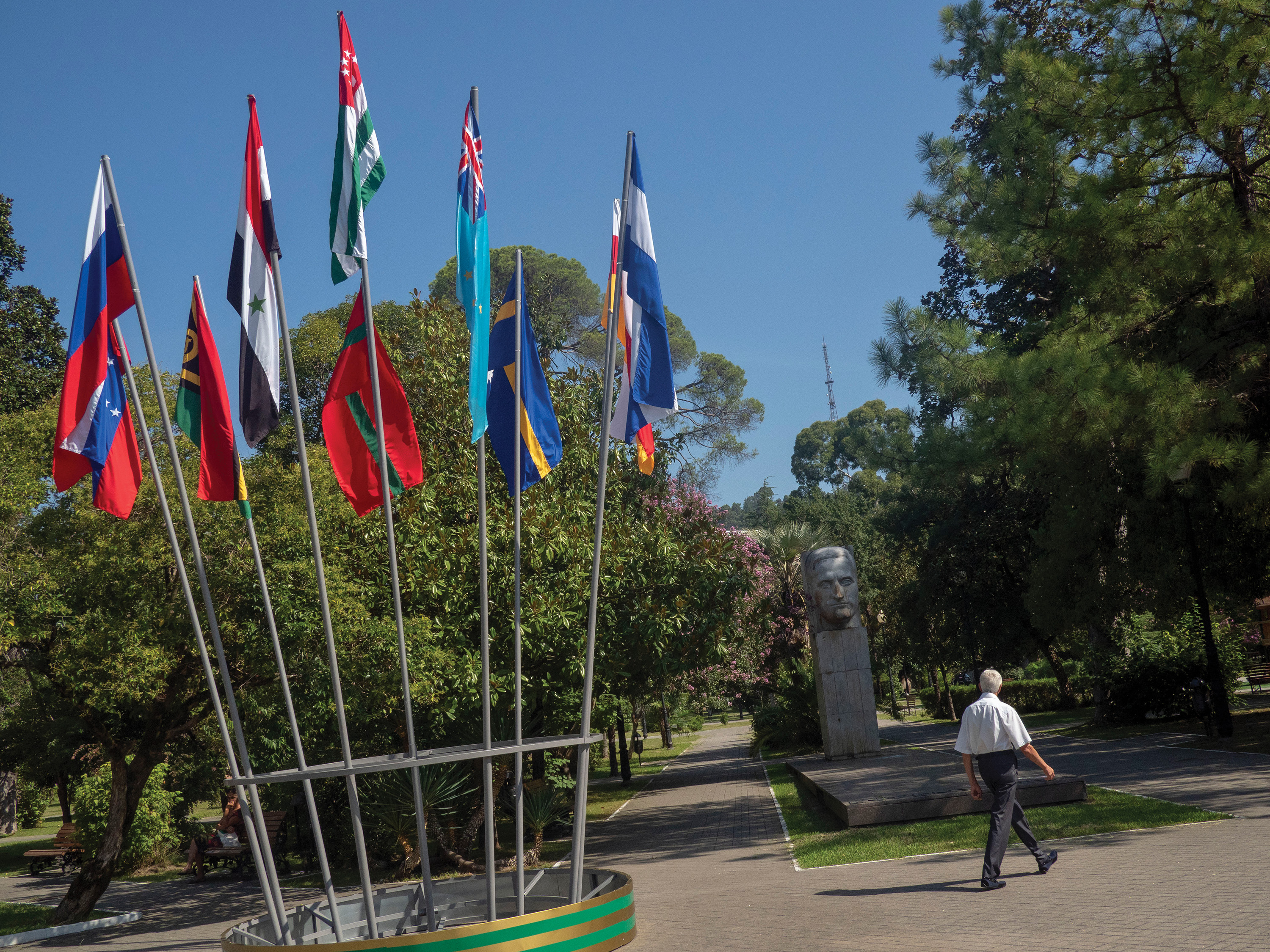
Abkhazia’s international isolation came after it broke away from Georgia proper following a war with Georgia from 1992 to 1993 over the question of Abkhaz independence. During the Soviet era, Abkhazia was considered an Autonomous Soviet Socialist Republic within the Soviet Socialist Republic of Georgia. Most ethnic Georgians who had been living in Abkhazia fled or were expelled to Georgia following the conflict, where many still live today as internally displaced persons or refugees, depending on who is doing the labeling.
Georgia’s stalwart insistence that Abkhazia is within its territory has meant that most of the world, including the U.S. and all of Europe excluding Russia, refuses to recognize Abkhaz independence. On Google Maps, the borderline separating Georgia and Abkhazia is dotted, just as it is between Kashmir and Pakistan and across the middle of Cyprus.
After the war ended in 1993, Abkhazia slowly set up its own government and has held elections and maintained the peaceful transition of power. In 2008, after a short-lived war between Russia and Georgia, during which Russia annexed Georgia’s South Ossetia region, Russia recognized Abkhaz independence. A few other countries followed suit with Russian encouragement, like Venezuela, Nicaragua, and Nauru. Syria recognized Abkhazia in early 2018, a move that in all likelihood had more to do with pressure from its benefactor, Russia, than with Abkhazia’s acceptance of the Circassian Syrians. In September, Abkhaz President Raul Khajimba and Prime Minister Gennady Gagulia met Syrian President Bashar al-Assad in Damascus. (On his way home from the summit, Gagulia died in a car accident.) In January of 2018, when I traveled to Abkhazia, the country’s foreign minister was on a diplomatic mission to Nauru. There aren’t many diplomatic missions he can go on.
And Abkhazia is also struggling to fill its borders with people. Its pre-war population of around 525,000 was halved as a result of the expulsion of the Georgians in 1993, and now consists of mostly Abkhaz, but also some remaining Russians and Armenians, and even fewer Greeks, Ukrainians, and Chechens. (Historically, Circassians mostly lived in what is now the nearby Russian Federation, especially around the city of Nalchik, the capital of the Kabardino-Balkar Republic.) The Abkhaz government has slowly been trying to repopulate its territory in its bid for nationhood. Yet most of the Abkhaz diaspora do not want to repatriate to their beleaguered ancestral homeland, outside of which their families have been living for over a hundred years.
Cue the Syrian refugee crisis, in which nearly six million people have fled a brutal war for various other countries. More Syrian refugees live in Turkey than anywhere else, and Lebanon and Jordan also host a considerable population. Since the beginnings of Syria’s civil war, and especially since 2015, hundreds of thousands more Syrians braved a deadly crossing on rubber dinghies to Europe, only to find that much of the continent had grown weary of their presence, in some places outright rejecting it.
Before the Syrian war, the Syrian-Circassian community consisted of around 100,000 people—a tiny fraction of Syria’s population of 22 million, but no less vulnerable than their neighbors to the all-consuming violence of the conflict. For the Abkhaz government, it was not important that most of the Circassian Syrians eager to flee the war were of mixed Abkhaz-Circassian ancestry or identified primarily as Circassian. Both peoples were from the northwest Caucasus; both their ancestors had been expelled by Tsarist Russia. Distinctions between Circassians and Abkhaz were fluid even before expulsion and had become even more so in exile. This gave Abkhaz bureaucrats a bigger pool of potential repatriates from which to pull. Abkhazia would take the Circassian Syrians willingly, and its government seemed to consider it politically advantageous to do so.
For Circassian Syrians, the breakdown of their state made them useful in the quest to build another nation. Abkhazia also offered them lives that weren’t under threat of violence. But in the end, they left one political maelstrom for another.

The Georgian side of its border-that-isn’t with Abkhazia is staffed by police officers who sit in a small office and monitor who is crossing back and forth each day. (Georgians who are from a border town in Abkhazia can obtain special permission to cross back and forth between territories.) Cars pull up to the checkpoint, and people step out and set off by foot across a bridge that spans the raging Enguri river as it pours down from the mountains. Horse-drawn carriages cart travelers the kilometer or so from the Georgian to the Abkhaz side, and aside from the rush of water and the occasional pattering of horse hooves, the world here is quiet when I cross on a rainy winter day.
On the other side of the river, I meet a small group of friendly Abkhaz border guards examining passports and visas. Just behind the Abkhaz checkpoint is a station of Russian security agents, who smile less and examine travelers more carefully.
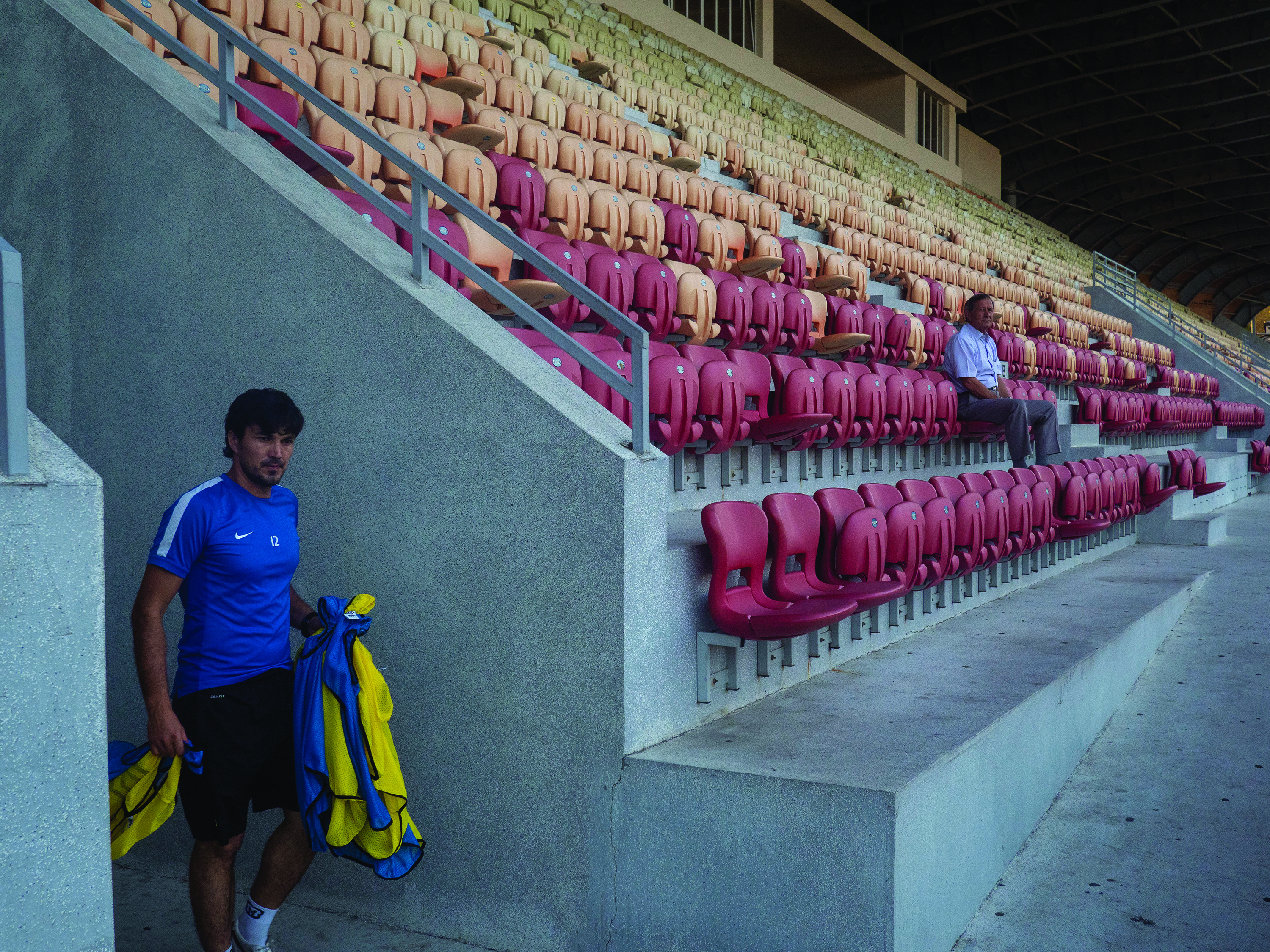
As you drive through Abkhazia from the de facto Georgian border, it is not immediately apparent which buildings have been destroyed by war and which have merely faced neglect over time. Once-elegant Soviet structures—a train station, factories, town halls—have faded beyond any recognizable glory. Where people have left Abkhazia, nature has taken over. The subtropical climate along the coast has resulted in dense undergrowth invading yards, curling over sidewalks, and creeping across the walls of abandoned homes. On the benches in half-empty roadside towns sit men with canes and babushkas with colorful scarves, watching the near-empty road or chatting with neighbors who pass by carrying bags of vegetables.
Sokhumi has an art center, a stately theater, and a hip hamburger joint, but, by and large, Abkhazia looks empty and poverty-stricken, like small towns in rural Oklahoma or West Virginia, but with Soviet murals and monuments as backdrop. It’s a far cry from the refinements of Damascus, where lots of the Circassian Syrian émigrés came from.

After the war started in Syria, word spread among the Circassian community that there was an opportunity to move to Abkhazia and receive citizenship there. Charter flights would fly them from Beirut Airport to Sochi, the nearest Russian city, since there is no international air travel to Abkhazia. The whole process, three flights in total, was bankrolled by Russia, which supports almost the entire Abkhaz state budget and stood to gain by aiding Circassian repatriation without actually having to help Circassians return to their traditional homeland inside the Russian Federation. The émigrés gathered in Damascus to board a bus bound for Beirut, Lebanon, where a small delegation from Abkhazia’s Ministry of Foreign Affairs came to meet them to accompany them on the remainder of their journey.
On the plane ride to Sochi, people were chatty and friendly, says Alaa Kattaw, a 28-year-old Syrian woman now living in Abkhazia. “Sadness was not the prevailing sentiment when we left. It was anticipation—anticipation for the journey, for the unseen land of ancestors, and for new life.” Once in Abkhazia, the Syrians were taken directly to one of Sokhumi’s fancier hotels, where temporary accommodations and a fireworks show celebrated their arrival. (Abkhaz spell their capital Sokhum, but the Georgian name, Sokhumi, is used in this article because it is the spelling most recognized internationally.)
According to the U.N.’s 1951 Convention Relating to the Status of Refugees, a person who had met the criteria for being a refugee is no longer a refugee if that person acquires a new nationality. None of the half-dozen Syrians I spoke with in Abkhazia consider themselves refugees, and they cite their Abkhaz citizenship as the reason. Still, to most of the world, that citizenship comes with an asterisk. “Since Abkhazia is not a recognized country by most of the world, Syrians living there would be considered to be living in an unadministered part of Georgia, which has not granted them any status,” explains Jan Brown, a New York-based immigration lawyer who has represented asylum applicants in the U.S. for 40 years. According to the U.N., the Syrians in Abkhazia are “refugee-like,” a subcategory that was first included in the refugee population count in 2007 and encompassed about 325,000 people around the globe as of 2017, according to the U.N. High Commissioner for Refugees.
The Abkhaz passport, even with its manifold limitations, does bring a sense of stability. Alaa says that the guarantee of citizenship made Abkhazia a more preferable place to settle as a refugee than the European Union. In Europe, Alaa felt that refugees were still vulnerable to the whims of international politics and of their host states. (Many Syrian refugees in the E.U. lack permanent residency.) “That’s one of the most important reasons why you can’t guarantee your future in Europe,” she says.
One late morning in January, Alaa and I take a stroll through the few central city blocks that make up downtown Sokhumi. In the middle of town, there is a small cluster of clothing stores and cafes, while along the sea runs a picturesque pedestrian street where old men spend the afternoon playing dominos and vendors rent miniature, battery-powered Abkhaz military tanks to children.
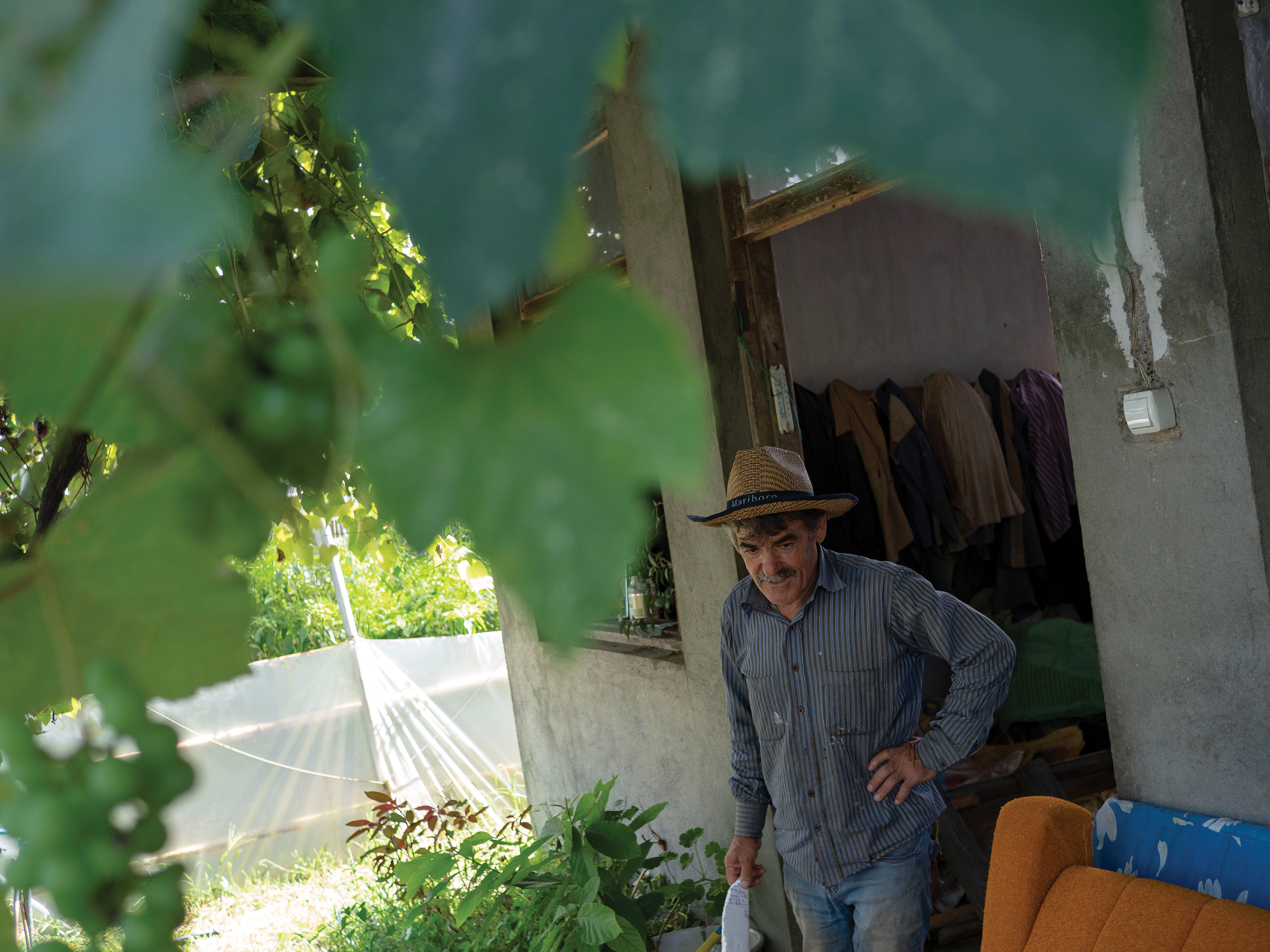
Compared to Sokhumi, pre-war Damascus was a cosmopolis like New York City—and Alaa is an educated Damascene. Her English contains hints of a British accent, and she has a degree in English language and literature from the elite Damascus University. Alaa is composed and carries herself like someone much older than she is, and I wonder whether surviving war is an experience that makes the wise wiser.
At a popular lunch spot that serves club sandwiches and tomato-cucumber salads, Alaa and I meet Sara Aljabban, a 20-year-old graphic design student at Abkhazian State University, who is also from Damascus. The three of us settle at an outdoor table. The sunshine is strong enough to keep us warm in our winter coats. Sara’s hair is in a high ponytail, and her demeanor is slightly flippant—in line with her age.
“I didn’t know about this place at all before I came here. I never thought about coming here,” she says in Arabic. “The first year was really hard. I didn’t know the language. I had to get used to being here really quickly. Now, it’s totally normal. It’s cool.”
Sara’s parents, dissatisfied with life in Abkhazia, have returned to Syria, but Sara stayed on to complete her degree, living with her aunt. What she is going to do with a degree from an internationally unrecognized university goes unsaid. I wonder if her studies are a convenient excuse for her parents to wait and see how events shake out in Syria. For now, Sara’s life is not all that different from what it would be elsewhere. She goes to class. She studies. She hangs with friends and chats on her phone. Sara does complain about the options for clothes shopping in Abkhazia, which, after a cursory look at the storefronts in downtown Sokhumi on the walk to the cafe, is a problem that has already crossed my mind.
Our conversation drifts into a more sardonic mode. Alaa, Sara, and I talk about Syrian immigration to the U.S. in the 1960s, when many new arrivals held dearly to the perceived idea of typical American life. Sara switches from Arabic to English to make a comment on how things have changed since then: “Now, this is our Abkhaz dream,” she says.
“And you guys have Syrian and Abkhaz passports,” I add, even as I know that, unlike them, I can move across most borders with few headaches, including the nearby border with Georgia, which I will cross en route home to Tbilisi. Meanwhile, the two young women sitting with me and sharing a half-liter of fruit compote have two of the weakest passports in the world—profoundly limiting their opportunities.
Alaa offers a wry laugh at the passport situation, but Sara mutters under her breath, once again in English, “We are so lucky.”

Feras is one of few Circassian Syrians who did not come to Abkhazia on the chartered flights from Beirut. He and his wife had been living in Iraqi Kurdistan at the time; it wasn’t until 2016, when they found themselves in Turkey, that they decided to make the journey to Abkhazia. Feras, 35 years old with a square jaw and stony exterior, is soft-spoken and composed when he tells me his story at a cafe in downtown Sokhumi. He’s pointedly reluctant to complain about where his life has taken him, noting that others have it worse: Many Syrians in Abkhazia are struggling to find work, and Feras had become a player as well as a coach at a Sokhumi soccer club, as the team’s only Syrian. “Here, in this country, there are good things and bad things. You have very bad things here. They don’t have work,” he tells me of his fellow Syrian émigrés. Abkhazia’s isolation has meant that international investment remains scant. Unemployment is around 70 percent.
Feras orders a cappuccino and scans the room for familiar faces. Abkhazia is a small place, and Sokhumi even smaller, with a population of some 60,000. Feras gained some notoriety as a player for the national soccer team during the World Cup for unrecognized countries, held in Sokhumi in 2016. The event, the second of its kind organized by the Confederation of Independent Football Associations, allowed unrecognized countries and peoples like Somaliland, Kurdistan, and Chagos Islands to face of in their own soccer tournament. With help from Feras, Abkhazia won.
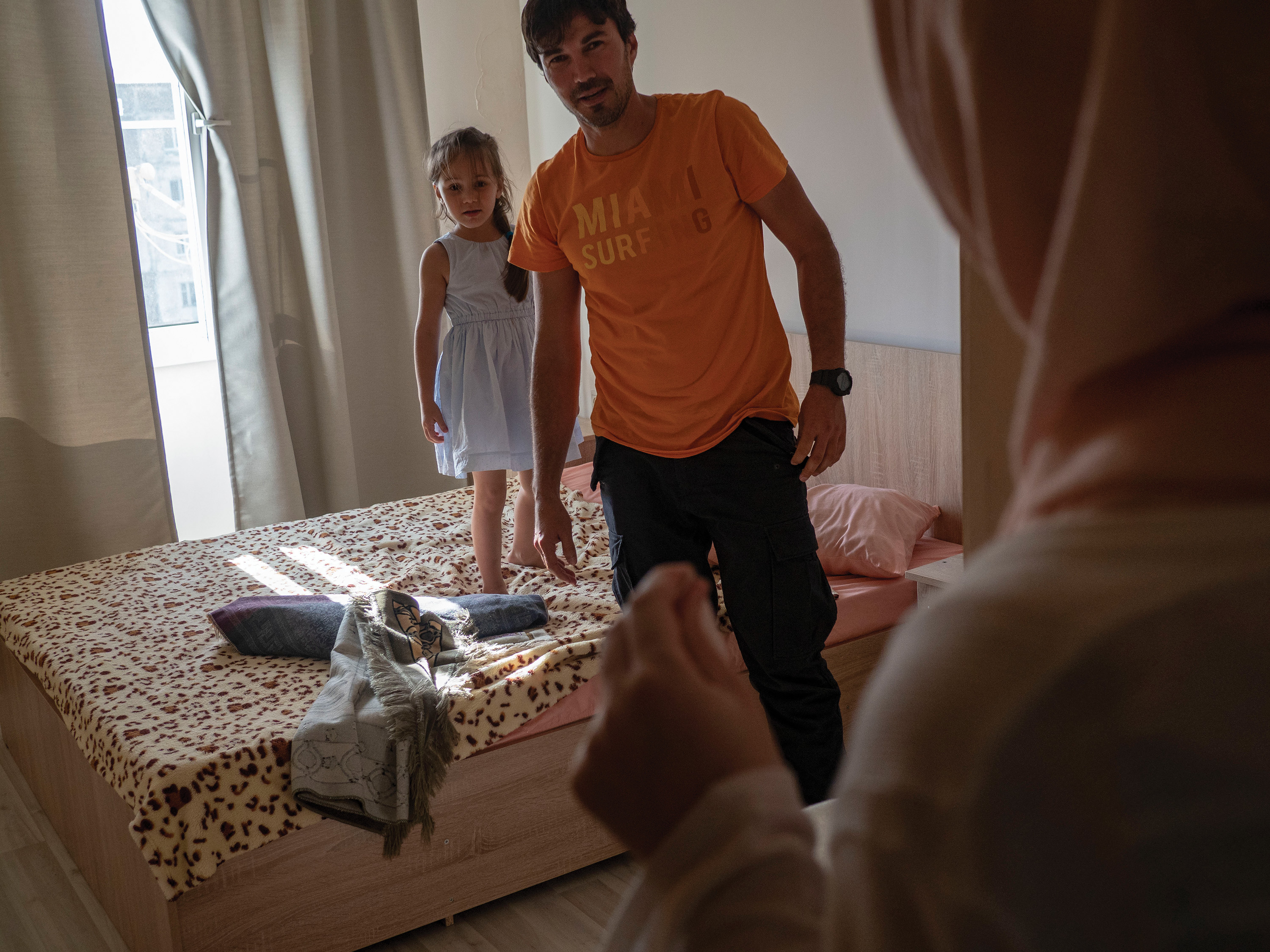
“I would like official coaching certification, but I can’t get it because here you coach without credentials,” he says. This will make it more difficult for Feras to find work outside Abkhazia.
Russia began giving the majority of Abkhaz citizens Russian passports in 2002, but has done so with less regularity since it began recognizing Abkhaz passports as legitimate in 2008. Even when Abkhaz are granted Russian passports, travel can be complicated; for instance, if their birthplace is listed as Sokhumi, this can prevent them from entering countries whose governments recognize Sokhumi as part of Georgia. The new Circassian Syrian arrivals have thus far not received Russian passports. It’s unclear whether they ever will.
Feras says that when he was younger and playing soccer on Syria’s national team, he received offers to play on league teams for European countries. “I didn’t go because I loved Syria so much,” he says, as regret for lost opportunity enters his voice for the first time. Still, even if he’s stuck in Abkhazia, Feras sees potential.
“I hope that Abkhazia will get recognized, that other countries will come here and see Abkhazia,” he says. “I want it to become a beautiful country.”
Flexible borders aren’t new to Feras. He explains to me that Circassian Syrians have been displaced twice: lately by the Syrian civil war, and the first time by the war with Israel in 1967, when many Circassians lived close to the Israeli border and fled Israel’s occupation of the Golan Heights to Damascus and Jordan. I am surprised he didn’t include Circassians’ initial displacement to the Ottoman Empire, and I mention this to him.
“Yes, it’s three times!” he says. Then his voice turns very serious: “This is a big problem.”
Even if the Syrians in Abkhazia have few job prospects and are stuck in a tiny sliver of territory, at least they are wanted by the ruling authority and general population. I’ve heard stories of great acts of kindness that the Abkhaz showed to their new Syrian neighbors. Still, some of the Syrians can’t help wanting to go back. As of early 2018, dozens had chosen to return to Syria from Abkhazia.
Kakun Fahmy and his family hope to be among them.

I meet the Fahmy family, whose names have been changed, in their sparse Soviet Bloc apartment, a 20-minute drive from Sokhumi. The former Soviet Union is full of old bloc-style apartment buildings, uniform monoliths, often in states of disrepair. The apartment building outside of Sokhumi where the Fahmy family lives looks as if the inside has caught fire a few times, and no one bothered to restore the place. It stands near the main road in an overgrown, green field pocked with large puddles from recent rains.
Kakun, a stout, middle-aged father of four, doesn’t want to be ungrateful for the free place to live. The Abkhaz government has paid for Syrians’ accommodations thus far. The problem he faces is a lack of work, he explains in his family’s somber living room. The Fahmys’ two coffee-colored sofas are donations from an international charity organization, and framed Islamic calligraphy—gold Arabic script on a black background—is the room’s only decoration. A window looks out onto more gray bloc apartment buildings, and past them to the rocky, treelined coast of the Black Sea. Three children try to sit dutifully across from Kakun and me, but, before long, they’re squirming and running between the living room and kitchen.
Hailing from a working-class family in Syria, Kakun now does freelance construction, and employment isn’t consistent. Kakun says that he needs to earn around $600 a month to support his family, and he finds salaries in Abkhazia to be between 15,000 and 16,000 rubles a month, around $250.
“That’s if one has a steady job. If you are working as a freelancer, then you aren’t going to get that much,” his wife Om Tarek chimes in from the kitchen, where she’s preparing tea over a small gas stovetop. A refrigerator hums in the background. There’s no water flowing from the taps at the moment, but there is electricity, and they seem to feel that one out of two isn’t so bad.
Kakun did not realize until he and his family traveled here that their presence in Abkhazia was meant as an instrument of propaganda. Now he’s grown more skeptical. There’s a palpable tenseness between his wife and him, a sense that the family has missed out on something better.
“It doesn’t matter if we are refugees or not,” Kakun tells me. He says that Europe is the promised land, and Abkhazia feels regrettably far from Europe, if not physically then certainly in spirit. (The Caucasus are arguably part of Europe, though the region defies the idea of clean continental lines between Europe and Asia.)
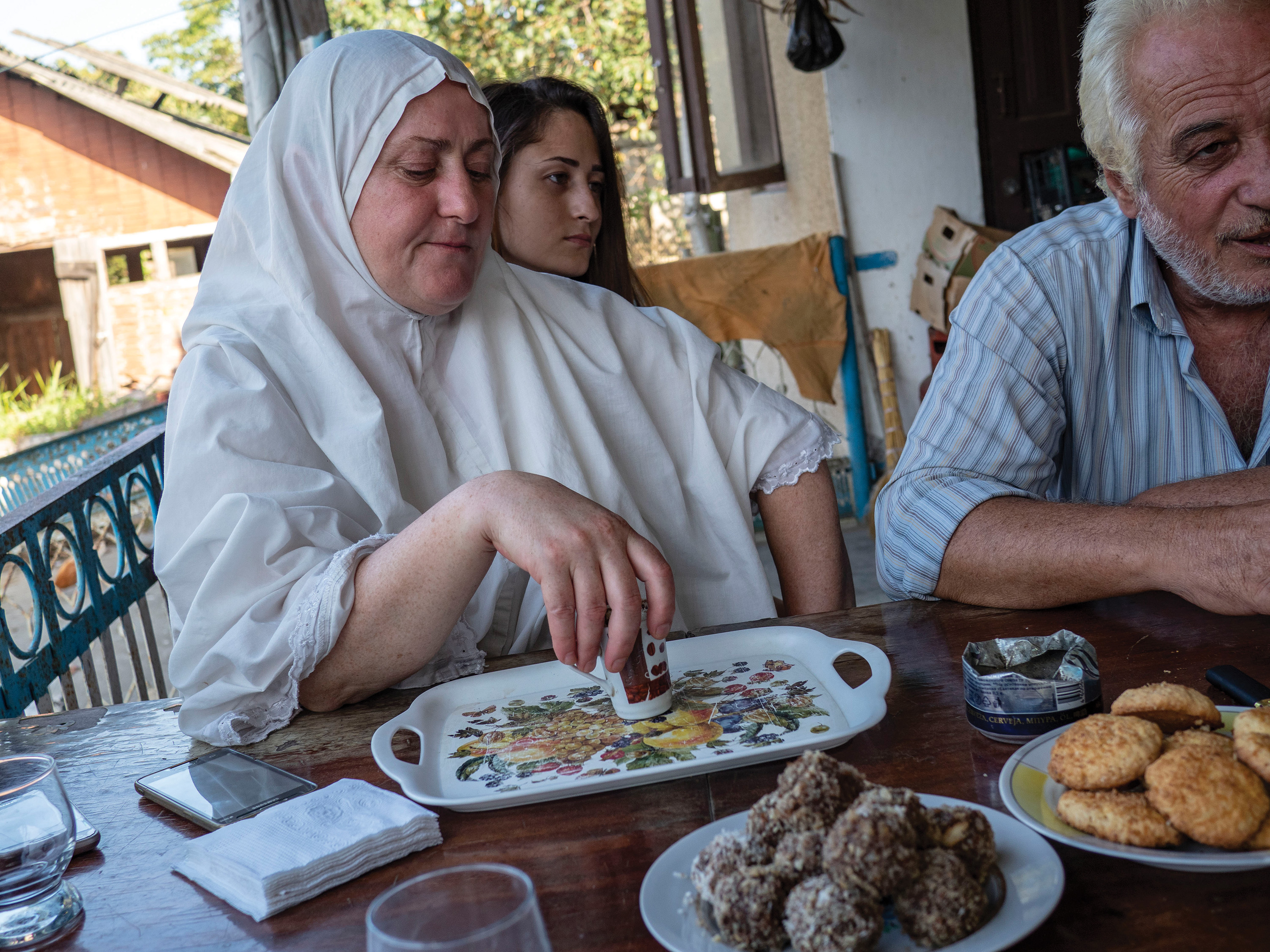
Om Tarek and Kakun have learned very little Russian in the few years they’ve lived here. Russian is the primary language spoken in Abkhazia, though some families speak Abkhaz at home, especially in rural areas. The Fahmys’ oldest son speaks Russian and Abkhaz, and their school-aged children have Abkhaz friends. The kids are much more assimilated, as is often the case in migrant families. If the Fahmy family stays in Abkhazia, especially as their ancestors came from this part of the world, the children will grow up Abkhaz and become part of the Caucasian peoples of the mountains. Here, family ties and ritual are to be honored, much as in the Arab world (one difference is that traditional Abkhaz celebrations are wine-soaked affairs). Communities here are close-knit and take care of their own. If the Fahmys stay, there would be no Assad family breathing down the children’s necks, but they would also continue to face limited options for mobility in the wider world, assuming Abkhazia’s political situation remains the same.
Abkhazia may be their ancestral homeland, but it isn’t home. Kakun and Om Tarek are insistent that their children are Syrians and not of this strange place. It’s a moot point anyway, since they’re in the midst of facilitating their return to Damascus.
Their youngest child, an infant asleep in one of the two bedrooms, is technically Abkhaz. She was born here and only has an Abkhaz passport, an arrangement that poses challenges as the family seeks to return home. One option would be to travel to Syria via Turkey, but Turkey doesn’t recognize Abkhazia, so their youngest couldn’t enter the country. The other way back is via Moscow, where she could obtain a Syrian passport at the embassy, the logistics of which Om Tarek and Kakun say are in the process of being sorted.
By way of illustrating their family’s patriotism, Om Tarek points to their second to youngest daughter, who left Syria as an infant. “She doesn’t remember Syria, but when she heard she was going back to Syria, she became very happy.”
Maybe the Fahmy children could grow up to love Abkhazia too, but they aren’t going to stick around to find out.

The State Committee for Repatriation is one of the more beautiful buildings in downtown Sokhumi, its eggshell-colored Moorish arches overlooking a small garden of palm trees and succulents. On the building’s second floor, a hallway displays black-and-white photos of prominent members of the Abkhaz diaspora from decades past.
Founded in 1993, the committee is the official branch of Abkhazia’s de facto government responsible for facilitating the resettlement of the Abkhaz diaspora within Abkhazia. It offers free Russian and Abkhaz language lessons for the repatriates, as well as free housing, and provides passports to the newcomers.
The Circassian Syrians I met in Abkhazia have told me that they were all given Abkhaz passports, the small blue book bearing the national emblem, a mythical horse and horseman from ancient Abkhaz legends. Every new citizen is a benefit to the new Abkhaz state, after all.
Still, when I meet Beslan Dbar, chairman of the Committee for Repatriation (since renamed the Ministry of Repatriation), he confirms that some Syrian arrivals were not given passports. Stately bookshelves lined with Cyrillic texts surround us. An Abkhaz flag—green-and-white striped, with a red square in its corner displaying an open-palmed right hand, a medieval national symbol denoting peace and hospitality—is mounted in the corner. Beslan, silver-haired and with a dour expression, begins our interview by reassuring me that he will be totally forthcoming because one cannot hide anything from the American government. I try to dispel his apparent conviction that I am an agent of U.S. intelligence, but my assurances seem to fall flat, and Beslan enters the guarded, evasive pose that he will maintain until ushering me out through the tall, wooden doors.
He is not at all forthcoming. He waves me off when I ask how many among the Abkhaz diaspora have been repatriated thus far: “To be honest, we will not give you this information today, but there are many of them. There are tens of thousands of them. This information is of strategic importance to us, so it’s classified,” Beslan says. Tens of thousands is an exaggeration, according to every Abkhazia expert I’ve spoken with; they say that repatriation hasn’t been anywhere near as successful as the Abkhaz authorities had hoped. “It’s possible that it’s true that thousands have [returned], but very few of them have stayed,” explains Oliver Bullough, journalist and author of a history of northern Caucasia, Let Our Fame Be Great: Journeys Among the Defiant People of the Caucasus.
Beslan wants me to understand how much the Abkhaz diaspora has achieved, he says. He stands up and walks to a cabinet to retrieve a small male doll dressed in traditional Caucasian mountain garb: a long, black robe worn over a bright, red shirt with decorative silver rifle cartridges slung across the chest. Beslan shows me the doll and then focuses on adjusting its sword for reasons that I cannot ascertain.
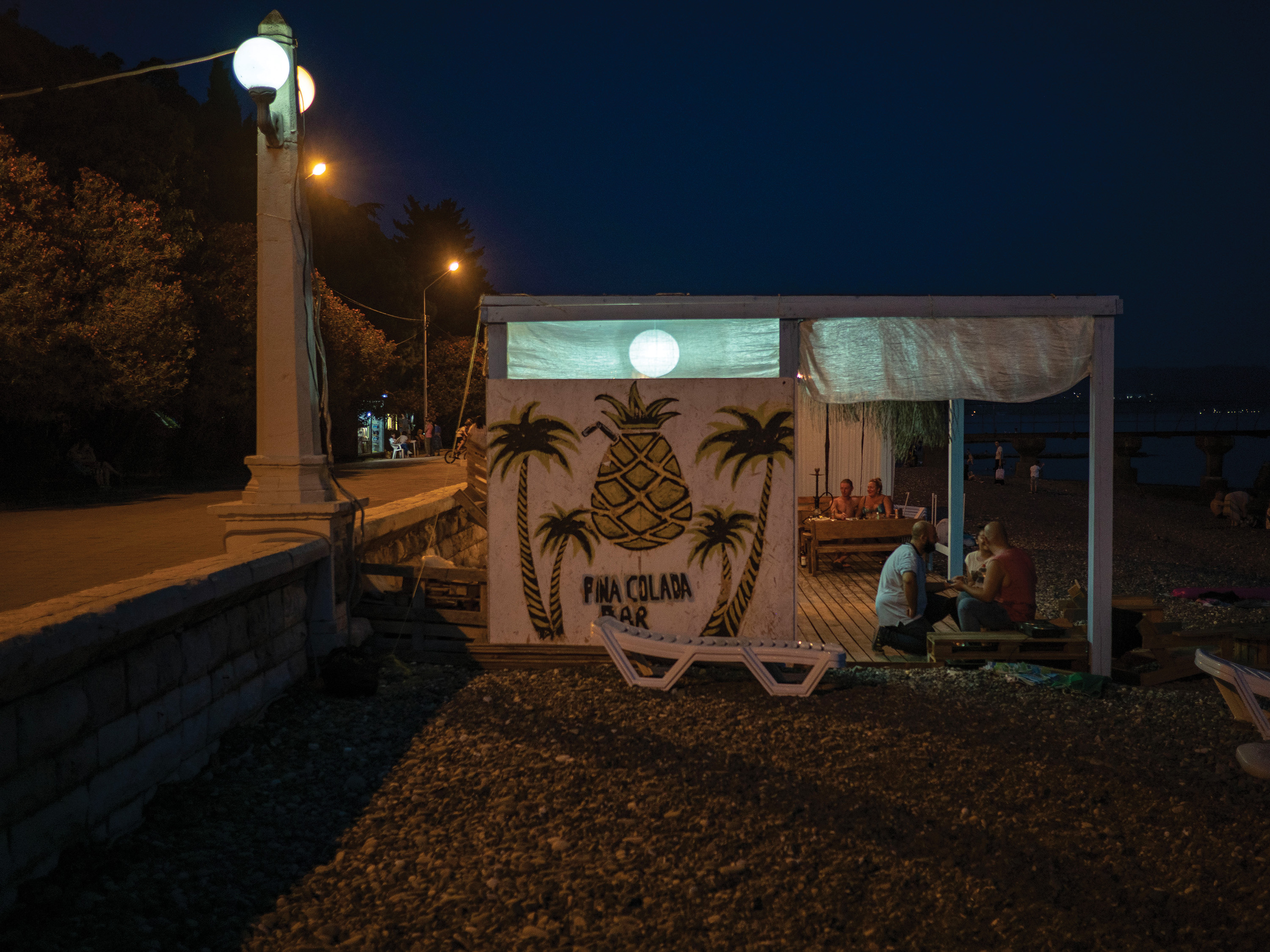
For a moment I have trouble paying attention to Beslan’s explanation—which he is giving in utmost seriousness—and instead become distracted as I watch a grown man fiddle with a doll. Beslan is telling me that this is the same outfit worn in Amman by Jordanian royal guards, who traditionally are diaspora Circassians. The doll’s clothes are also, as far as I can tell, very similar to a Georgian chokha, national dress used for ceremonial purposes or during dance performances, but I do not mention this to Beslan.
I ask Beslan how it would be possible to encourage members of the Abkhaz diaspora to move here if they are so settled in their home countries, like Turkey, Jordan, and Israel. He scoffs at the question. “If you look at it in terms of a cosmopolitan lifestyle, then of course it’s better to live where it’s comfortable, but if you look as a citizen or a patriot, then it’s better to live where your homeland is.”
“As you know, Syrian people went through a horrible war,” Beslan continues. “A once-flourishing country was turned into….” Beslan pauses, just for a moment, as if unable to think of the appropriate word to describe what Syria has become. He changes tactics. “Cities, villages, all infrastructure was destroyed. And despite all the hardships we are enduring, our financial difficulties, we accepted a big group of refugees from Syria.”
“Now the repatriates, together with local residents, are jointly building an independent Abkhaz state,” he continues. “They are represented in business, in politics, in economy. In brief, they are fully integrated in our society.”

Feras and I leave the cafe where we first met to travel to Sokhumi’s soccer stadium, where he has a meeting with a head coach. He tells me that I can come along and see the stadium, which is relatively new and modern, a description that doesn’t apply often in Sokhumi. We slide into Feras’ car, a cheap import from Japan with the steering wheel mounted for left-side driving, though traffic stays to the right in Abkhazia.
Sokhumi’s leafy streets are quiet, and Feras drives through them with the air of a man who is worn out. “I went to Turkey, and I learned Turkish. I went to Kurdistan, and I learned Kurdish. I forget, I forget,” he tells me. I insist that it’s incredible that he’s learned so many languages, but Feras seems disappointed with himself, especially for forgetting English. Feras’ Russian is also a work in progress.
As we drive, we pass Abkhaz strolling down cracked sidewalks, and a marshrutka, a public minibus of the sort used throughout the post-Soviet world, speeds past us. Vines grow up the side of elegant and crumbling redbrick homes.
“There is parliament,” Feras says, indicating a tall, beige-colored vacant building in front of us, blasted, burned, and left to stand as a monument to the 1992–93 conflict. “Harb, harb,” Feras says under his breath, repeating the Arabic word for war. After a short drive, Feras and I reach the home of Sokhumi’s Nart Football Club. Feras offers few details about his meeting, and I wonder whether he even knows what it’s about. First, he takes me on a mini-tour of the stadium. The seats are empty, and I imagine them packed with spectators during the World Cup of unrecognized nations last year, and Feras aglow with victory on the field. We enter a small office to the side of the main entrance.
The office’s walls are lined with pale wooden planks, like the inside of a Finnish sauna. Three men are sitting in the room drinking tiny cups of Turkish coffee. Feras tells them I’m a visiting American journalist, and the announcement sets off nothing more than shrugs. The man in the far corner asks if Feras and I want coffee. We decline.
Then Feras says to me in Arabic: “Really, I don’t know Russian.”
A coach of the Nart Football Club, an unimposing man who reminds me of an Abkhaz Larry David, sits at a desk in front of Feras and proceeds to start their meeting, speaking loudly in broken Russian that is difficult to follow even if you’re fluent. If Feras did know the purpose of this meeting prior to our arrival, he seems immediately more confused once the coach begins speaking.
“Training. Tomorrow. Game. We need barrier. Barrier. Training. All. Football. Doctor. But in Abkhazia, we cannot go to America. America does not recognize Abkhazia, so we can’t go there,” the coach says, the America bit said with a nod toward me.
Feras leans forward in his chair, following along attentively. “I will tell them tomorrow. There is football. Yes,” he said, of his teammates.
“We have training camp now. There is training in the morning. In the evening, you know, electricity, Abkhazia, problem,” the coach says, referring to frequent outages. “Also, water. Water.” He makes the sound of running water to emphasize his last point.
“Three months, we have no water in Agudzera,” Feras says, referring to the town where he lives outside of Sokhumi.
“Now you don’t have water? Where?!” The head coach responds.
“We don’t have water,” Feras says again.
“Is it not working? Why?” the head coach inquires.
“Elevator?” Feras says, hesitant because he knows he may not have chosen the right word.
“No, the pump!” the coach responds.

I can’t imagine that whatever the coach has been trying to tell Feras about training has been conveyed, and if it was, I’m unsure as to why it merited a meeting. It feels like a dark comedy: two men in a country that sort of exists, talking in a language that one of them sort of speaks, about water that might never come. Feras does not seem deterred, and the conversation moves onto politics now that soccer has been taken care of: specifically, the politics of the Kurds, another people without their own country, whose right to sovereignty had been skipped during the partitioning of the Middle East by powers in Europe. The coach becomes more assured of Feras’ Russian comprehension and begins using slightly longer sentences.
“How is it in Syria? Are there many Kurds fighting? Can they fight?” The coach asks Feras.
Feras answers with a simple yes.
“Kurds that are fighting are in Syrian territory. What about Iraq? Are they the same?”
“The difference is like you are Abkhaz, and I am Circassian,” Feras replies.
“See, everyone is just saying Kurdish. We don’t know all these details about the differences,” the coach says. “And what’s the capital? Capital. Abkhazia, Sokhum.”
“Erbil,” Feras responds, though it is only the capital of semi-autonomous Iraqi Kurdistan, the closest thing to a capital that Kurds have.
The coach nods, satisfied that he has added to his understanding of the situation. He goes on to speak with the other two Abkhaz men in the room about war in Kurdistan, wondering why the world wanted to divide the Kurds, to keep them from succeeding in their desire for nationhood. His explanation spins off of what Feras has told him. “Every 20 to 50 years, there also is war in the Caucasus,” the coach says, as the talk of fighting in Kurdistan reminds him of conflict closer to home. Feras nods along. Finding footing for himself in his new home is not an elegant process, especially since the more he assimilates and establishes a life for himself here, the more it commits him to staying. Feras admitted to me earlier that the future he wishes for his family and himself doesn’t place them in the foothills of the Greater Caucasus, but back in Syria. “My dream is that I am able to buy a house and have a business in Syria,” he says.
The Fahmy family is betting on a future in Syria even without peace. Alaa and Sara are young and have dreams of Western Europe or North America. Feras is torn between the old home and the new. Abkhazia wants them all to stay and build a state, even though Abkhaz citizenship becomes more like pageantry when they are forced to rely on it. All the while, Russia uses the question of Abkhaz independence for its own agenda. And so, in the northwest reaches of the Caucasus, the global merry-go-round of displacement continues to spin.





